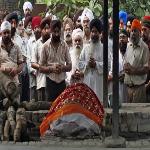Top Indian officials say they need to prepare for terrorism threats that may arise both within and outside the country.
Indian Home Minister P. Chidambaram on Thursday described recent terror attacks on Indian soil as a "blot" on the government, and said more needs to be done to prevent them in the future.
"The challenge of terrorism is a formidable challenge, and requires a comprehensive strategy of counterterrorism," he said.
Fourteen people were killed in last week's bomb explosion outside a Delhi high court. In July, three back-to-back bomb blasts in busy sections of the financial capital, Mumbai, killed 20.
Chidambaram told a conference of senior law enforcers and security personnel that Pakistan and Afghanistan remain "the epicenter of terror," but that India must also take seriously threats from within.
"There are Indian modules too," he said. "They seem to have the capacity attract radicalized youths to their folds... many of these modules have acquired the capacity to make bombs."
Chidambaram defended the record of Indian police, saying there were only 11 unsolved terror cases out of 48 since 2000. However, he said more must be done to charge and convict terrorists.
Experts say India's police force is understaffed and underequipped, and that hundreds of thousands more police personnel need to hired and trained.
Ajit Dhoval, former director of the Intelligence Bureau, India's domestic intelligence agency, describes terrorists inside India as an "invisible enemy."
"Today it is more of a surreptitious, secret actions like planting some improvised explosive devices somewhere," Dhoval said. "And for that, if you have got more precise ground intelligence and operational intelligence... it is not as much a game of numbers, as better intelligence, which is the most important thing."
Dhoval also said it is critical for India's counterterrorist forces to have people operating as closely as possible to the groups they are tracking.
"For human intelligence to be effective, the people who tell you should be more knowledgeable, and if possible, they should be very close to them," Dhoval said.
India established its National Investigative Agency, or NIA, after the Mumbai terror attacks of November 2008, during which gunmen killed 164 people. It is working towards integrating more than a dozen databases into a single consolidated system called the National Intelligence Grid in order to track the movements of suspected terrorists more effectively.
